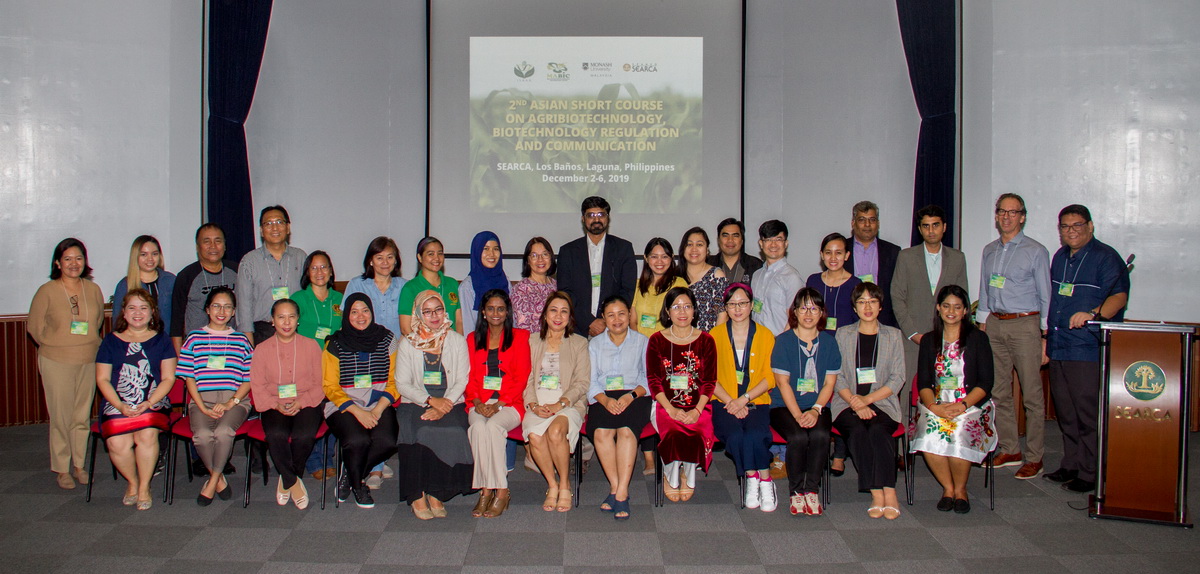
Asian Course Tackles Importance of Integrating Research, Effective Communication and Science-based Regulation in Agribiotech
December 4, 2019| |
Recognizing the importance of integrating research, effective communication, and science-based regulatory frameworks in harnessing the full potential of agribiotechnology to fuel sustainable agricultural development, SEARCA partnered with the International Service for the Acquisition of Agribiotech Applications (ISAAA) Southeast Asia, Malaysian Biotechnology Information Center (MABIC), and Monash University Malaysia in organizing the Asian Short Course on Agribiotechnology, Biotechnology Regulation, and Communication (ASCA). It runs from December 2 to 6, 2019 in the Philippines.
Now in its second year, this program aims to enable participants to have a better understanding of the entire value chain of living modified organisms (LMOs), as well as national and international legal instruments regarding LMOs. It also aims to discuss effective communication of agribiotechnology and biosafety regulation.
In his opening message, SEARCA Director and National Academician Dr. Glenn B. Gregorio, highlighted the Center's important role in advancing science-based innovations to address poverty and food security. "We stand behind products of agribiotechnology that increase agricultural productivity to feed a growing population in the midst of dwindling natural resources and erratic changes in climate," Dr. Gregorio says. "Due attention must be given to our resource-poor farmers by providing them access to information, best practices, and new technologies that gives them a fighting chance to cope up with the many challenges they face and to open up better opportunities for them and their families so that they can have better quality lives," he adds.
According to ISAAA Global Coordinator, Dr. Mahaletchumy Arujanan, "It is important that Asia has institutional memory on international agribiotechnology regulatory framework as the field is very complicated and turnover among policymakers and regulators is high. ISAAA and its partners aim to develop Asia's institutional memory so that capacity building in this area could be sustained and scaled up".
"Together with various international and local partners, ISAAA Southeast Asia developed a hands-on, experiential training program on agribiotechnology, exercises on food/feed safety assessment, and tips on strategic communication, and risk management and communication," says Dr. Rhodora Aldemita, ISAAA SEAsiaCenter Director. "We are very pleased that we were able to gather 25 participants from both public and private sectors of eight countries: China, Indonesia, Malaysia, Pakistan, the Philippines, Taiwan, Thailand, and Vietnam," she adds.
For more updates about biotech development in the Philippines, visit the SEARCA BIC website.
| |
You might also like:
- PH Biotech Community Zooms In on Regulation of Genome Edited Plants in the Country
- PABIC, University of Agriculture Faisalabad Conduct Seminar to Assess Food Security, Malnutrition, and Biotech in Pakistan
- Engaging Editors Crucial for Improved Science Reporting in Kenya
Biotech Updates is a weekly newsletter of ISAAA, a not-for-profit organization. It is distributed for free to over 22,000 subscribers worldwide to inform them about the key developments in biosciences, especially in biotechnology. Your support will help us in our mission to feed the world with knowledge. You can help by donating as little as $10.
-
See more articles:
-
News from Around the World
- Engineering Self-fertilizing Plants to Reduce Environmental Footprint
- PopSci Hails Impossible Burger 2.0 as Most Important Engineering Innovation in 2019
- Scientists Discover How Sorghum Controls Genome to Survive Drought
- India Develops Drought Tolerant and Disease Resistant Chickpeas
- Asian Course Tackles Importance of Integrating Research, Effective Communication and Science-based Regulation in Agribiotech
- South Australia A Step Closer to Lifting GM Ban
- European Commission Authorizes 8 GM Products for Food and Feed Uses
- Field Trials Reveal Blight Resistant GM Potatoes
-
Research Highlights
- Brazilian Scientists Publish Most Complete Genome Sequence of Commercial Sugarcane
-
Plant
- Scientists Explored the Use of CRISPR-Cas9 to Improve Kitaake Rice
-
Read the latest: - Biotech Updates (December 17, 2025)
- Gene Editing Supplement (December 17, 2025)
- Gene Drive Supplement (February 22, 2023)
-
Subscribe to BU: - Share
- Tweet

